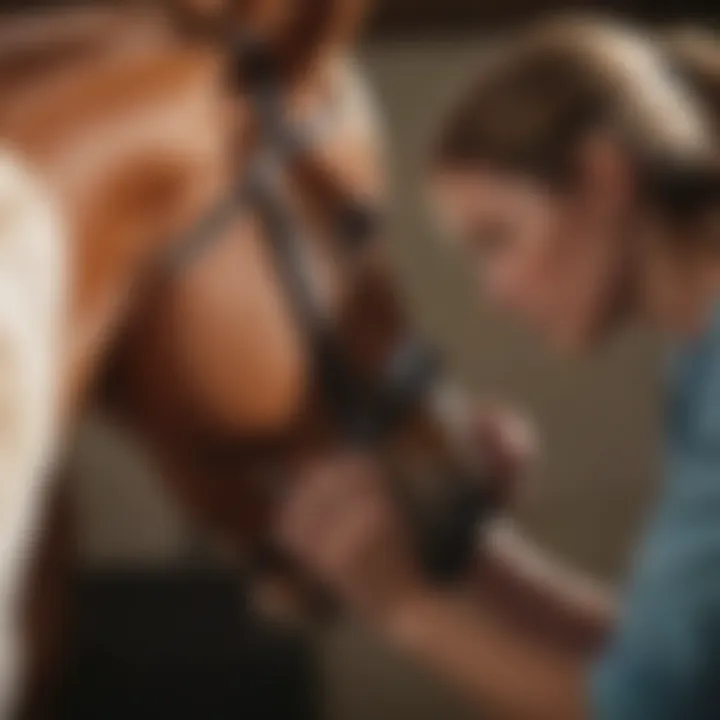Broodmare Vaccination Schedule for Optimal Health


Intro
Vaccinations are a critical aspect of animal husbandry, particularly in equine care. The importance of maintaining the health of broodmares cannot be overstated. These animals are not only valuable for breeding but also play a significant role in the overall health of the foals they carry. Proper vaccination schedules contribute to the long-term well-being of both mares and their offspring.
Understanding the vaccination process helps caregivers make informed decisions. A comprehensive vaccination plan reduces the risk of infectious diseases, ensuring that both the mare and foal thrive. By examining the guidelines for a broodmare vaccination schedule, we can appreciate the significance of timing and vaccination type throughout different stages of the mare’s reproductive cycle.
Understanding the Importance of Vaccinations for Broodmares
Vaccinations play a pivotal role in ensuring the well-being of broodmares. Proper vaccination not only protects the mare but also has lasting effects on the health of the foal. Understanding the nuances of this topic is essential for equine owners and those involved in breeding. It is, therefore, crucial to consider the regular vaccination schedule as part of a comprehensive health management plan.
Role of Vaccinations in Equine Health
Vaccinations serve as a first line of defense against infectious diseases. Diseases such as tetanus and rabies can have devastating effects on equine populations. Vaccines stimulate the immune system, enabling it to recognize and combat specific pathogens. In broodmares, this is crucial since they are not only responsible for their own health but also for the health of their offspring.
The role of vaccinations is not limited to prevention alone. They help in maintaining herd immunity. When a significant portion of the mare population is vaccinated, the spread of infectious diseases is reduced. This creates a safer environment for all equines. Furthermore, having a robust vaccination protocol can be beneficial when it comes to travel and competition. Many events and facilities require proof of vaccination.
Impact on Mare and Foal Health
The health of a broodmare directly impacts the development and health of her foal. Vaccines administered during pregnancy can offer passive immunity to the foal. This protection is transmitted through the mare’s colostrum, which the foal consumes shortly after birth. For instance, vaccines against diseases like West Nile Virus and Eastern Equine Encephalomyelitis can be vital for the survival and health of the newborn.
Moreover, unvaccinated mares may face higher risks of complications during pregnancy and foaling. This can lead to increased mortality rates among foals or long-term health issues. By ensuring that broodmares are up-to-date with their vaccinations, owners are also safeguarding their investments in breeding.
Common Misconceptions About Vaccinations
Despite the clear benefits of vaccinations, several misconceptions persist among equine owners. One common belief is that horses do not require vaccinations if they appear healthy. This is misleading. Infectious diseases can often be present without obvious symptoms, and failure to vaccinate can lead to severe outbreaks.
Another misconception is that all vaccines are the same and can be administered indiscriminately. This is not true. Vaccines are tailored to specific pathogens, and administering the incorrect vaccine can be ineffective or even harmful. It is essential to consult veterinary professionals to determine the appropriate vaccination protocol for each individual mare based on her health status, environment, and breeding plans.
"Proper vaccination is not just a responsibility; it is an investment in health—both for the mare and her foal."
In summary, understanding the importance of vaccinations for broodmares is vital in promoting overall equine health. Addressing misconceptions and recognizing the role vaccinations play can make a significant difference in the success of breeding programs. By committing to comprehensive vaccination strategies, mare owners can ensure healthier futures for both their mares and foals.
Essential Vaccines for Broodmares
Vaccinations play a crucial role in maintaining the health of broodmares. Proper vaccination not only protects the mare but also has significant implications for the welfare of her foal. When mares receive essential vaccines, they build immunity that can be transferred to their offspring through colostrum, the first milk produced after giving birth.
In this section, we will explore core and additional recommended vaccines that are critical for broodmares. Understanding these vaccines helps in developing protocols that align with the health needs of both the mare and her foal, ensuring optimal health outcomes.
Core Vaccines
Core vaccines are those that are universally recommended for all horses, including broodmares. They protect against diseases that can have serious health consequences.
Tetanus
Tetanus is caused by the bacterium Clostridium tetani, which can enter the horse's body through wounds. The importance of vaccinating against tetanus cannot be overstated, as the disease often results in severe muscle spasms and can be fatal.
Tetanus vaccinations are beneficial because they are effective and have a long duration of immunity. Many owners begin the vaccination process when the foal is young, ensuring that it receives protective antibodies from its mother. The unique feature of the tetanus vaccine is its robust ability to prevent disease, making it a cornerstone in any vaccination schedule. However, it is necessary to maintain regular boosters to ensure lasting protection.
Eastern and Western Equine Encephalomyelitis
Eastern and Western Equine Encephalomyelitis (EEE/WEE) are viral diseases that cause severe neurological symptoms and can lead to death. Both strains of the virus are transmitted through insect bites, particularly mosquitoes.
Vaccinating against these diseases is a smart choice for broodmare health, especially in regions where these viruses are endemic. The key characteristic of these vaccines is their effectiveness in preventing disease outbreaks within a herd. Their administration typically requires an annual booster, making the planning of vaccination schedules straightforward and manageable.
West Nile Virus


West Nile Virus is another viral infection that poses risks to horses, leading to neurological issues and even death. It primarily spreads through mosquito bites, making vaccination critical in many climates.
The West Nile virus vaccine is regarded highly for its ability to prevent this debilitating disease. This vaccine has been shown to provide solid immunity and is usually given once a year. Mare owners particularly find this vaccine advantageous due to its widespread availability and proven efficacy in lowering infection rates.
Additional Recommended Vaccines
While core vaccines are vital, additional vaccines can further enhance the health of broodmares and their foals. These vaccines protect against diseases that may be more common in specific regions or populations.
Influenza
Influenza is a highly contagious respiratory disease that can quickly spread among horses. It is particularly concerning for pregnant mares who can suffer from complications that may affect the foal.
Vaccination against influenza is beneficial for protecting the overall health of the mare. The vaccine tends to provide good immunity; however, boosters are often recommended every six months to maintain protection. One unique aspect of the influenza vaccine is its adaptability, with some formulations offering broad coverage against various strains.
Strangles
Strangles, caused by the bacterium Streptococcus equi, can lead to serious respiratory issues and abscess formation in horses. This disease is particularly contagious and can spread quickly within groups of horses, making vaccination important.
Strangles vaccination is popular among broodmare owners due to its potential to prevent outbreaks. The vaccine offers protection but can have mixed efficacy depending on the strain. Additionally, adverse reactions occasionally occur, so discussing vaccination options with a veterinarian is vital.
Rhinopneumonitis
Rhinopneumonitis, also known as equine herpesvirus, presents significant risks during pregnancy. Infected mares may experience severe complications, which can impact the health of the foal.
Vaccination against rhinopneumonitis is essential due to its role in preventing outbreaks and protecting the mare during pregnancy. The unique feature of this vaccine is its ability to induce immunity at critical times, especially in late gestation. The vaccination is effective but does require awareness of proper timing to maximize benefits.
Vaccination is a key pillar in maintaining the health of both broodmares and their foals. A thorough understanding of essential vaccines can empower owners to make informed decisions.
Creating a Broodmare Vaccination Schedule
Creating a vaccination schedule for broodmares is critical for maintaining their health and ensuring the well-being of their foals. A well-structured plan allows for the timely administration of vaccines, which helps to bolster immunity and prevent infectious diseases. Moreover, it provides a framework within which owners can manage the health care needs of each mare, thus facilitating proactive measures rather than reactive solutions.
Planning this schedule requires an understanding of the mare's reproductive cycle, age, health status, and any history of vaccine reactions. Owners must also consider external factors such as seasonal outbreaks of diseases in the area. The benefits of a carefully planned vaccination schedule extend beyond individual mares; a healthier broodmare population contributes to the overall health of the equine community.
Initial Vaccination Protocol
Generally, broodmares should start their vaccination protocol well before breeding. Initial vaccinations often focus on core vaccines. These are essential to building a strong foundation in immune response. Vaccines such as Tetanus, Eastern and Western Equine Encephalomyelitis, and West Nile Virus should be administered at least six to eight weeks prior to breeding.
Additionally, new broodmares should have a thorough veterinary examination at this stage. This ensures any underlying health issues are addressed before introducing a vaccination.
Pregnancy-Related Vaccination Timeline
As mares progress through their pregnancies, adjustments to the vaccination schedule are essential. For example, administering the Influenza and Rhinopneumonitis vaccines is often recommended during the fifth, seventh, and ninth months of gestation. This helps to ensure adequate antibody transfer to the foal through the mare's colostrum.
The timing of these vaccinations is critical. If administered too late, the antibodies may not develop adequately before foaling. Therefore, close monitoring of the mare's condition and any updates to local disease outbreaks are crucial during this period.
Postpartum Considerations
After foaling, attention turns to both the mare and the newborn foal. The mare's health should be closely monitored for signs of postpartum complications. Vaccination records from her pregnancy should guide the next set of vaccinations. Typically, the mare should receive booster shots of core vaccines approximately two to three months after foaling. This ensures she remains healthy and can provide the necessary immunity to her foal.
Factors Influencing Vaccination Timing
Vaccination timing for broodmares is crucial to ensuring optimal health for both the mare and foal. It is essential to recognize the various factors affecting when vaccinations should be administered. Understanding these influences can help owners and caregivers create effective vaccination plans tailored to each mare’s individual needs, ultimately leading to better health outcomes.
Age and Health Status of the Mare


The age and overall health condition of the mare play significant roles in vaccination schedules. Young mares may have different immunological needs compared to older ones. For instance, younger mares may still be developing their immune systems and could benefit from certain vaccinations earlier. Older mares often have a history of various vaccinations, and their immunity may wane over time. Therefore, it is vital to consult a veterinarian to assess the specific age-related factors affecting vaccination. Regular health evaluations can identify any pre-existing conditions that may necessitate modifications in vaccination protocols.
Environmental Factors
The mare’s living conditions significantly influence vaccination timing. Environmental stressors, such as overcrowding, exposure to disease, and geographic location, can impact a mare’s susceptibility to infections. Broodmares kept in high-density environments are at a higher risk of disease transmission. These conditions may require vaccinations to be administered sooner than in lower-risk environments. Additionally, areas with recent outbreaks of specific equine diseases should prompt immediate vaccinations, regardless of the scheduled timeline. Understanding the environmental context is crucial to developing a proactive vaccination strategy.
History of Vaccine Reactions
Each mare’s history of vaccine reactions should not be overlooked. Some mares may have had mild to severe reactions to previous vaccinations. This history has implications for future vaccinations. Consulting with a veterinarian about any such reactions enables tailoring the vaccination schedule. In certain cases, alternative vaccines or adjusted timelines may be necessary to reduce the risk of adverse effects. Keeping a detailed record of past reactions can also aid veterinarians in making informed decisions regarding future vaccinations.
Monitoring the health status of broodmares post-vaccination is equally important, ensuring that any unexpected responses are promptly addressed.
By taking these factors into account, mare owners can successfully time vaccinations to enhance effectiveness while minimizing health risks. This careful consideration reflects a commitment to optimal equine health, leading to healthier broods and stronger foals.
Monitoring Mare Health Post-Vaccination
Monitoring the health of a mare post-vaccination is a critical process that can greatly influence both her immediate well-being and long-term health outcomes. Various vaccines, while essential for disease prevention, can lead to transient effects following administration. Being vigilant about these changes allows for prompt response to any complications that might arise.
Assessing the post-vaccination condition involves looking for signs of adverse reactions and understanding what to do when these reactions occur. This knowledge not only enhances health outcomes for the mare but also ensures the health and safety of her foal.
Signs of Adverse Reactions
Vaccinations can induce reactions in some horses. It is important to identify adverse signs early on. Common signs to monitor include:
- Mild Fever: A slight increase in temperature can be normal after vaccination, but sustained high fever should be concerning.
- Swelling at the Injection Site: Localized swelling is common. However, if the swelling is severe or spreads, further evaluation is warranted.
- Lethargy: Post-vaccination fatigue that lasts more than a day may indicate an issue.
- Loss of Appetite: A refusal to eat or drink is a potential warning sign that should be addressed.
- Respiratory Distress: Any abnormal respiratory noises, such as coughing or wheezing, should be evaluated immediately.
It is essential to monitor these symptoms for at least 48 hours following vaccination. Any signs that worsen or do not resolve should lead to consultation with a veterinary professional.
When to Consult a Veterinarian
Timely consultation with a veterinarian is vital under specific circumstances. If a mare exhibits persistent symptoms such as fever that exceeds 102°F, severe swelling, or significant behavioral changes, it is time to seek professional help. Other factors that warrant a call to the vet include:
- Unusual Signs: Any unexpected or severe reactions should prompt immediate communication.
- Prolonged Symptoms: If symptoms such as lethargy or loss of appetite go beyond a reasonable time.
- Complications or Doubts: If there is any uncertainty about the normalcy of the mare’s condition, reaching out to the veterinarian provides peace of mind.
It is always better to err on the side of caution when it comes to the health of a mare and her foal.
In summary, monitoring post-vaccination health is essential to swiftly address potential adverse reactions. This proactive approach allows for better outcomes and underscores the importance of integrating comprehensive health management practices in breeding programs.
Vaccination Records: Importance and Maintenance
Vaccination records play a critical role in the health management of broodmares. Maintaining accurate documentation is essential for tracking the vaccination history of each mare. This information safeguards against the risk of infectious diseases and suitably informs future veterinary care.
Keeping Accurate Records
Accurate records encompass several key details. First, the date of each vaccination should be noted. This ensures adherence to the recommended vaccination schedule. Additionally, it is essential to record the type of vaccine administered. Different vaccines target various diseases, and knowing which have been used helps to avoid duplication and manage timing effectively. Furthermore, any adverse reactions must be documented. These records become invaluable when analyzing the wellness of a mare post-vaccination. Regular updates allow for proactive assessments rather than reactive measures.
- Key elements to include in vaccination records:
- Date of vaccination
- Type of vaccine
- Administering veterinarian’s details
- Any observed reactions or side effects
Using Records for Health Monitoring
Utilizing vaccination records extends beyond documenting history. They are pivotal for ongoing health monitoring. By referencing these records, caregivers can pinpoint when the mare is due for her next vaccination. This rhythmic monitoring of dates helps maintain optimal immunity levels against diseases. Moreover, trends in health can be extracted from these records, such as patterns in vaccine efficacy or reaction severity.
Monitoring health through vaccination records contributes to informed veterinary discussions. It allows for necessary adjustments in future vaccination plans based on the mare's specific health history and needs.


In summary, maintaining vaccination records is not merely a good practice; it is a requirement for effective broodmare health management. By ensuring that all relevant information is recorded and utilized, horse owners can significantly enhance the care and protection of both their mares and foals.
Consulting with Veterinary Professionals
Consulting with veterinary professionals is a crucial component in establishing an effective vaccination schedule for broodmares. Veterinarians possess specialized knowledge about equine health, from the biology of the mare to common diseases that can affect both the mare and her foal. Their expertise aids in identifying specific health risks based on individual environments, management systems, and mare history.
Establishing a Vaccination Plan
When designing a vaccination plan, a veterinary professional evaluates various factors such as the mare's age, health status, and breeding history. Developing a plan is not a one-size-fits-all approach. For example, older mares might require different vaccinations compared to younger ones due to lingering immunity or previous exposures to diseases. The vet can also recommend the optimal timing for administering vaccinations, which is crucial in ensuring that the mare's immunity is robust during pregnancy and lactation.
The establishment of a vaccination plan typically involves:
- Health assessment: Conducting a thorough examination of the mare's health status.
- Customized vaccine choices: Selecting core and additional vaccines based on region, climate, and exposure risks.
- Creating timelines: Developing timelines that work well within the breeding and foaling schedule.
Tailoring Vaccination Schedules
Veterinarians also play a vital role in tailoring vaccination schedules to fit the unique needs of each broodmare. Tailoring involves periodic evaluations and adjustments based on the horse's response to previous vaccinations, any adverse reactions noted, and changes in health status. For instance, if a mare had a negative reaction to a specific vaccine in the past, the veterinarian may provide alternative options or adjust the schedule for similar vaccines.
Important aspects of tailoring a vaccination schedule include:
- Monitoring health changes: Keeping track of any new health issues or changes in the mare's environment.
- Feedback from past vaccinations: Using data from previous vaccine responses to inform future decisions.
- Strategic timing: Ensuring vaccinations are given at optimal times to maximize immunity, particularly concerning foal development.
"The best outcomes for mare and foal health originate from thorough, tailored vaccination plans that accommodate individual needs."
The Role of Biosecurity in Vaccination
Understanding the role of biosecurity in the vaccination of broodmares is crucial for preventing disease spread. Biosecurity refers to the measures taken to protect animals from infectious diseases. In the context of broodmares, implementing strict biosecurity protocols supports overall health and ensures vaccines are effective. Thousands of horses face health risks from common pathogens, making these measures essential.
Creating a Safe Environment for Broodmares
A safe environment is the foundation of health for broodmares. First, maintaining clean spaces can significantly reduce pathogen load. Regularly cleaning stalls and feeding areas should be a priority. This action also includes disinfecting equipment and ensuring that shared resources are sanitized.
Moreover, managing the movement of other animals in and out of the area is important. New horses should be quarantined for a period to observe for signs of illness before they mingle with the existing population. This step helps in identifying potential outbreaks early.
It is also wise to control access to the breeding facility. Limiting the visitors to essential personnel decreases the risk of introducing disease. Implementing a visitor log and ensuring proper hygiene practices for all individuals can help maintain biosecurity.
Integrating Biosecurity Measures with Vaccination Plans
Ensuring that biosecurity measures align with vaccination plans enhances their effectiveness. First, timing vaccinations properly according to the biosecurity protocols is essential. For instance, if a mare is due for vaccination, ensuring she is not exposed to unvaccinated horses before or after the procedure is critical. This consideration helps in optimizing the immunity response to the vaccine.
Additionally, maintaining thorough records of vaccination dates and health checks aligns with biosecurity practices. This practice allows for tracking any reactions or side effects more efficiently, ensuring that immediate response plans can be executed.
Lastly, communication between horse owners, veterinarians, and farm managers is necessary for successful integration. Regular discussions about biosecurity updates and vaccination schedules contribute to a sound strategy that protects both mares and foals from infectious diseases.
Biosecurity and vaccination are two sides of the same coin in safeguarding broodmares against potential health threats. They are most effective when implemented together.
Future Considerations in Broodmare Vaccination
Understanding future considerations in broodmare vaccination helps to maintain the health and productivity of these valuable animals. The landscape of veterinary medicine is always shifting, influenced by emerging data and technological advancements. By acknowledging these changes, equine owners and caregivers can make informed decisions that ultimately benefit both mares and their foals. The focus should be on evolving vaccine technologies and ongoing research into vaccination efficacy, both of which play crucial roles in the future of safe and effective vaccination protocols for broodmares.
Evolving Vaccine Technology
Vaccine technology continues to evolve, offering potential advancements that promise to enhance the effectiveness of immunizations in broodmares. Modern vaccines are not only more effective but also increasingly safer due to improved formulations. Advances like recombinant vaccines or mRNA technologies could lead to tailored immunizations that target specific pathogens without the risks associated with traditional vaccines. Such innovations are critical as they may provide broader protection against emerging diseases that affect equine health.
It is essential to stay updated about these developments. Consulting with veterinary professionals about the latest advancements ensures that broodmares receive the best available vaccines. Adapting to innovations could mean modifying vaccination schedules or incorporating newly-developed vaccines. As the veterinary field progresses, regularly revisiting vaccination practices helps to align with the best options available.
Research on Vaccination Efficacy in Broodmares
Ongoing research into vaccination efficacy is vital for ensuring that protocols are based on sound scientific evidence. Studies frequently assess how different vaccines perform across various breeds, ages, and health statuses. These insights lead to improved recommendations for vaccination protocols, helping to protect broodmares against diseases effectively.
Furthermore, research can unveil the duration of immunity provided by specific vaccines. Understanding how long vaccinations remain effective allows horse owners to create precise revaccination schedules. Conducting periodic assessments ensures that the broodmares maintain optimal levels of protection, which is essential for both mare and foal health.
By integrating knowledge of new technologies and research findings into vaccination strategies, broodmare owners can ensure that their animals remain healthy and resilient against potential diseases.



